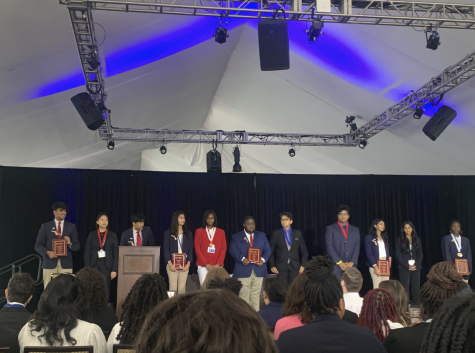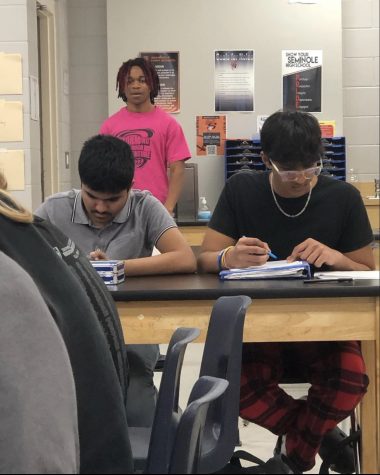BEES BUZZ TOWARD EXTINCTION
Bee populations are dwindling, and humans hold the responsibility of saving these powerful pollinators.
May 12, 2016
Recently, the honey bee population has been decreasing at record-breaking rates, due to several factors such as climate change, pesticides and habitat loss. Bee populations are at an all-time low and are now relying on humans to intervene and prevent them from ultimate extinction.
A major factor in the decline in honey bee numbers is the widespread use of harmful pesticides, which are lethal to pollinating bees. Companies such as Monsanto, Syngenta and DuPont are the producers of these detrimental pesticides, resulting in the discovery of over 150 different types of chemical residue in bee pollen. These companies have greatly contributed to the major decline of bee hives in the United States, which have reduced from 6 million hives in 1947 to 2.4 million hives in 2008.
Several countries have already taken action to regulate pesticides on bee populations. For example, Mexico has placed a ban on genetically modified crops, such as corn, in order to allow native species to flourish. Bhutan has also adopted a policy of organic farming, which mandates that all crops must be grown 100% naturally and without the aid of pesticides.
Unfortunately, many people are unaware of these implications and continue to support the pesticides produced by these companies and the effects they leave on the ecosystem. To avoid hurting the bee population while still keeping gardens free of harmful insects, petroleum oils or organic herbicides can be sprayed to replace toxic pesticides.
Sophomore Iffat Nawsheen comments, “I believe [that] the media overlooks these types of environmental dangers simply because it’s not what people want to hear. We open magazines for something juicy or happy, not for a bee scandal that makes us feel guilty about not taking action.”
Apart from pesticides, climate change has also impacted the honey bee demographic. While a bee colony usually diminishes by 5-10% during winter in the United States, in 2006, 30-50% of bee hives died off due to the fluctuations in the weather in recent winters. Although climate change is a less controllable issue, actions can still be taken to decrease the carbon footprint humans leave on the Earth, such as using eco-friendly products and reducing gas emissions from cars.
There are also a multitude of benefits that bees provide to humans, which is why it is imperative that humans play their role in saving them. For instance, 70% of the overall food groups are pollinated by bees, making up 90% of the human population’s nutrition. Without the help of bees, there would be a severe lack of variety of foods available for human consumption and the human race would receive significantly insufficient nutrition.
Advanced Placement Environmental Science teacher Mr. Kris Cole says, “The bee crisis is a very underrated issue. It is important we help these little pollinators if we can. Our food supply is dependent on the bees pollinating the plants we eat.”
While this issue cannot be solved completely, individual actions can be taken to help in preserving the bee population. Protecting bee habitats, using eco-friendly pesticides, and simply refraining from killing them upon sight but shooing them away instead can play a part in helping the species.
The bee crisis is a major issue facing today’s ecosystems and can have detrimental effects on the human race if it is not stopped. Now, more than ever, it is crucial that action is taken to prevent their extinction.


































